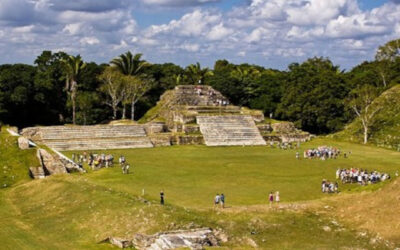Why is faith difficult? That question is not new to the Christian life. Most want to know: Is there a short answer to that question? A few years ago a short answer gained popularity. It went like this:
Let go and let God!
The premise is simple and the statement is concise. But it was only truly helpful to those who had learned a great deal more about faith. And that’s the problem with the short answers to most of life’s hard questions. They lack two things:
- An essential depth of understanding.
- Principles to guide us.
But the good news is, we have a record that gives us the understanding and the principles to guide and grow our faith. Abraham is revered as an example of faith by Christians, Jews and Muslims. That commonality is pretty rare. So let’s look into the Old Testament and learn from the man Scripture refers to as the father of faith.
Why Is Faith Difficult?
 Abram’s family is noted in Genesis 11. Then the account of his life begins in chapter 12. But it’s more than a narrative account. We are told:
Abram’s family is noted in Genesis 11. Then the account of his life begins in chapter 12. But it’s more than a narrative account. We are told:
Now the Lord had said to Abram…
That reveals a faith principle that we have to deal with. God was revealing His will to Abram. And that is a constant factor in faith. God reveals His will and then we must respond. God told Abram what to do then Abram had to respond to that revelation. Faith always works on the principle of revelation/response. That was true for Moses when he encountered God at the burning bush. And the pattern was the same for Gideon, David, Isaiah, all the Apostles, me and you! But you say:
God hasn’t spoken to me like He spoke to those people.
God has spoken to us. Primarily, He does it through His Word. The revelation of His will for you and me is written down and we have the same obligation as all those who have gone before us. We must respond to the Word of God. Now that we see the principle, let’s see what else God said to Abram. Then we will look at Abram’s responses. God said to Abram:
Get out of your country, from your family and from your father’s house, to a land that I will show you. I will make you a great nation; I will bless you and make your name great; and you shall be a blessing. I will bless those who bless you, and I will curse him who curses you; and in you all the families of the earth shall be blessed.
 God obligated Himself in all those promises to Abram. Count the I will statements!
God obligated Himself in all those promises to Abram. Count the I will statements!
A Hard Truth About Faith
But God’s word to Abram, which shows us the revelation/response principle, also contains another feature of faith. Look at the Lord’s words again:
Get out of your country, from your family and from your father’s house to a land that I will show you.
Do you see the next principle? God’s land that I will show you was completely unknown to Abram. God did not identify it. Why? Faith always has an element of the unknown – unknown to us. Facing the unknown is a hard thing. And that’s one main reason faith is difficult. We must trust God to know what is best and to always do what is good. The problem is, all too often, we trust our own reasoning more than we trust God. Yet, in God’s goodness He tells us:
Trust in the Lord with all your heart and lean not on your own understanding; in all your ways submit to Him, and He will make your paths straight – Proverbs 3:5-6.
However, Abram didn’t have the book of Proverbs! In fact, he was a pagan idol worshiper when he received God’s revelation (Joshua 24:2). And Acts 7:2-4 confirms that God made His promises before Abram left the land of Ur. Why did Abram need to leave everything that was familiar to him? This gives us another principle:
What God requires of us is good for us.
For Abram to become a faithful follower of God, he would need to separate himself from the familiar temptations and distractions of paganism. It’s the same idea as a sober addict who avoids places of known temptation. But God didn’t explain that to Abram. The Lord just said: Leave your land and your family… Abram had to choose to follow God without God’s complete revelation of Himself (the Scriptures). We can see God’s character and know that the message of the Bible is this:
God is good. He cannot, and will not, require of us anything that is not good.
Our problem is we don’t always have His perspective!
God’s Ways Are Amazing
The next thing we see in our examination is the principle of reward. Once again, Abram didn’t have the benefit of reading the entire Bible. If we could take a journey back in time and encourage him, we could share three very important things:
- God does not change. He is the same yesterday, today, and tomorrow and forever (Micah 3:6; John 1:1-3; Hebrews 13:8).
- God owes nothing to anyone. Scripture tells us that He is not a debtor to anyone (Romans 11:35-36). What He does for us is fully an expression of His great grace.
- Faith is the only way we can please God. That truth is plainly stated in Hebrews 11:6. But it also informs us that God is a rewarder of those who seek Him. Furthermore, we know that God delights to give good gifts to His children (Matthew 7:11; James 1:17).
For Abram, God’s gift of grace (reward) was expressed as: I will make you a great nation. But God’s giving is in abundance. He gives to His own pressed down, shaken together and running over (see Luke 6:38). So God multiplied that promise with two amazing additions:
- Divine provision and protection (bless those who bless you; curse those who curse you)
- A Divine blessing that would extend through Abram to all the families of the earth.
I am certain Abram had a lot of questions. Afterall, the human mind doesn’t comprehend the ways of God (Isaiah 55:8-9). And Abram didn’t have the book of Genesis to read because God had not yet instructed Moses to write it! So how does one take steps of faith without the benefit of God’s written Word? That brings us to Abram’s responses to God.
Faith And Trust: A State Of Mind
Abram did leave the land Ur. That was a response of faith but didn’t demonstrate complete trust. It was only partial obedience because he also took his father, Terah, and his nephew, Lot. He failed to leave his family behind. Furthermore, he stopped in Haran and stayed for 25 years, until Terah died.
God’s Word reveals the obvious as well as things that are more subtle. For instance, the name Terah means wanderer or loiterer. Haran means dry and/or barren. Put those details together and we see that Abram’s partial obedience caused two things:
- Loitering delayed God’s promises (no heirs born in this time to make a great nation)
- A barren spiritual life (no further word from God until Abram was fully obedient).
When Abram was fully obedient there was spiritual growth.
Faltering Steps Of Faith
 After Terah’s death, God’s promises to Abram were repeated in the opening of Genesis 12. Abram left Haran, taking Lot, and journeyed all the way to Canaan. After Abram had seen some of the land of Canaan, God spoke to him again. This time it was a Divine promise to give that land to Abram and his descendants. That’s why Canaan is called the Promised Land. Abram gave a proper response to this new revelation: He built an altar to the Lord Who had appeared to Him and made that magnificent promise. So far, so good!
After Terah’s death, God’s promises to Abram were repeated in the opening of Genesis 12. Abram left Haran, taking Lot, and journeyed all the way to Canaan. After Abram had seen some of the land of Canaan, God spoke to him again. This time it was a Divine promise to give that land to Abram and his descendants. That’s why Canaan is called the Promised Land. Abram gave a proper response to this new revelation: He built an altar to the Lord Who had appeared to Him and made that magnificent promise. So far, so good!
After exploring the land a bit further, Abram built an altar between Bethel and Ai in order to call upon the Lord. Again, the names give us insight. Bethel means house of God. Ai means pile of rubble/rocks. It seems Abram had come to the proverbial fork in the road. We can call it a faith crisis. That is confirmed in the next two verses.
There was a severe famine in Canaan. Would Abram trust God’s word or try to fend for himself? Let me get to the bottom line this way: Would he choose house of God which was in difficult circumstances or would he choose pile of rocks which seemed to be full of good things?
He chose to go to Egypt (pile of rocks) which was not the Promised Land God had already shown him and promised to give him and his descendents. And you may ask:
Why was that such a bad choice?
The Word of the Lord to Abram was to make him into a great nation (see opening). Since Abram still had no children, there was no possibility he would starve due to the famine in Canaan (house of God). Trusting God by faith would have been the sole reason to stay in Canaan. And we can only imagine the miracles God would have wrought to see Abram through those difficult times.
Blunders And Blessings, But…
 God is good! Doubting that makes it a hard thing to put our complete trust in God. And what Abram did in Egypt (see Genesis 12) shows us the consequences of acting in our own power and wisdom. Those events also demonstrate the truth of what the Apostle Paul wrote in Romans 8:28. Our Mighty God is more than capable of working for our good in bad times, good times and even in our blunders. God used a pagan king to reprimand Abram as well as to bless him. And we see that the whole Egyptian experience caused spiritual growth in Abram.
God is good! Doubting that makes it a hard thing to put our complete trust in God. And what Abram did in Egypt (see Genesis 12) shows us the consequences of acting in our own power and wisdom. Those events also demonstrate the truth of what the Apostle Paul wrote in Romans 8:28. Our Mighty God is more than capable of working for our good in bad times, good times and even in our blunders. God used a pagan king to reprimand Abram as well as to bless him. And we see that the whole Egyptian experience caused spiritual growth in Abram.
Genesis 13 tells us that Abram came back to Canaan – to the exact altar he had built before leaving for Egypt. He went back to that fork in the road between Bethel and Ai. And this time he chose the house of God. Then we see another step of trust. Abram finally separated himself from Lot. The little faith that he had was growing! And this is another Old Testament illustration of a New Testament truth about the testing of your faith (James 1:2-4). So now we come to another faith principle:
Faith in God does not exempt us from the storms of life.
 Genesis 14 opens with the account of Abram having to rescue Lot from a small group of evil kings who had taken him captive. God made Abram victorious but the incident was not without risk. When the battle was won, Abram met Melchizedek, the priest of God most high. Abram received Melshizedek’s blessing. Further, Melchizedek received Abram’s worship (tithes). Those actions, and Hebrews 7, are why many scholars believe this mysterious character was a pre-incarnate appearance of Jesus Christ. And that would seem to be a high point in Abram’s journey of faith. There’s more!
Genesis 14 opens with the account of Abram having to rescue Lot from a small group of evil kings who had taken him captive. God made Abram victorious but the incident was not without risk. When the battle was won, Abram met Melchizedek, the priest of God most high. Abram received Melshizedek’s blessing. Further, Melchizedek received Abram’s worship (tithes). Those actions, and Hebrews 7, are why many scholars believe this mysterious character was a pre-incarnate appearance of Jesus Christ. And that would seem to be a high point in Abram’s journey of faith. There’s more!
In Genesis 15 God promised to give Abram a son – even in his old age. But that didn’t happen right away. So Sarai, his wife, suggested giving her slave Hagar to Abram as a wife. Maybe this would be God’s method to provide a son since Sarai was beyond child-bearing years. Unfortunately, Abram agreed to this!
Faulty Faith Has Consequences
Hagar did have a son. This became a source of contention with Sarai and she actually blamed the problem on Abram as if it had been his idea. And it was the angel of the Lord who told Hagar that her descendants would be too numerous to count (Genesis 16:10). In addition, verse 12 describes her son as:
A wild donkey of a man; his hand will be against everyone and everyone’s hand against him, and he will live in hostility toward all his brothers.
The brothers would be Abram’s other children. Hagar’s son was Ishmael, father of all the Arab peoples. Has there been hostility between Abram’s other descendants (Israel) and the Arab nations? Yes! And here is the spiritual principle to be learned.
God does not go back on His word or take back His gifts.
We see this in Romans 11:29. So when God told Abram his descendants would be as numerous as the sands of the sea then it didn’t matter who the mother might be. History records centuries of conflict between these two people groups. What if Abram had trusted God and waited on Him?
Greater Steps Of Faith
 We have two more things to cover. First, in Genesis 17, God appeared to Abram. The Divine promise was repeated and then God changed Abram’s name. From this point on, we know him as Abraham. Abram means exalted father. Abraham means father of many nations. Think about that for a second. How many years did a childless man introduce himself as exalted father? And when he had only one son his name got changed to father of many nations.
We have two more things to cover. First, in Genesis 17, God appeared to Abram. The Divine promise was repeated and then God changed Abram’s name. From this point on, we know him as Abraham. Abram means exalted father. Abraham means father of many nations. Think about that for a second. How many years did a childless man introduce himself as exalted father? And when he had only one son his name got changed to father of many nations.
His names would have been something of an embarrassment in a society that prized children so much. Having his name become a bigger burden was probably the last thing on Abraham’s mind. But the name change also brought about God’s promise that within a year Isaac would be born and he was the son of promise. It is through him that all the nations of the earth will be blessed. In this we learn that God’s thoughts and ways are not our thoughts and ways (Isaiah 55:8-9). He is faithful in all things but operates on His own timetable. That’s a reality of our faith that is often difficult for us.
Abraham’s faith continued to grow. And finally, we see Abraham’s faith in full form. Isaac was born and grew as little children do. Abraham loved him immensely. These things make the account of Genesis 22 both puzzling and poignant. God called Abraham to sacrifice Isaac as an offering of worship. The events show us another faith principle. Abraham’s example will reveal it.
 Abraham took Isaac, and the wood he would use for the burnt offering, and set out to obey God. Abraham built an altar and placed Isaac on it. Then he raised his knife in the air with the intent of plunging it into Isaac. It was on the precipice of Isaac’s death that God intervened. He stayed Abraham’s hand and provided a lamb for the sacrifice.
Abraham took Isaac, and the wood he would use for the burnt offering, and set out to obey God. Abraham built an altar and placed Isaac on it. Then he raised his knife in the air with the intent of plunging it into Isaac. It was on the precipice of Isaac’s death that God intervened. He stayed Abraham’s hand and provided a lamb for the sacrifice.
A Biblical truth is that our hearts determine our actions. Or, what’s on the inside will be seen on the outside. So we can see what was in Abraham’s heart:
- God is to be trusted in all things
- God is to be trusted above all things
Those are principles of faith that challenge every believer. Abraham knew Isaac was the son of promise. God had plainly told him that. And repeatedly, God had told Abraham he would be the father of many nations and from him a blessing would come to all nations. At this point, it is apparent that Abraham believed those things with all his heart. He must have believed that if he sacrificed Isaac that God could, and would, bring Isaac back to life. Now that’s faith. But it wasn’t easy and it didn’t come quick. Abraham was assured that God is good, trustworthy and faithful in all things. Evidence of that is the actions he took (see also Hebrews 11:1).
We Already Have All We Need
So I leave you with Peter’s inspired words in II Peter 1:2-4 (NASB) –
Grace and peace be multiplied to you in the knowledge of God and of Jesus our Lord; seeing that His divine power has granted to us everything pertaining to life and godliness, through the true knowledge of Him who called us by His own glory and excellence. For by these He has granted to us His precious and magnificent promises, so that by them you may become partakers of the divine nature, having escaped the corruption that is in the world by lust.
 God’s promises, His Word, which is what Peter noted and what we can read in our Bibles, is much more than Abraham had at his disposal. So our faith should come easier than his. Love God supremely (Greatest Commandment) and trust Him in all and above all!
God’s promises, His Word, which is what Peter noted and what we can read in our Bibles, is much more than Abraham had at his disposal. So our faith should come easier than his. Love God supremely (Greatest Commandment) and trust Him in all and above all!
















0 Comments